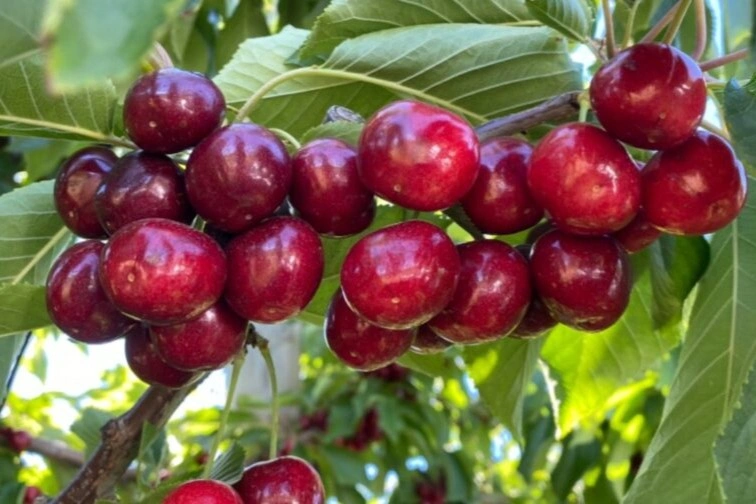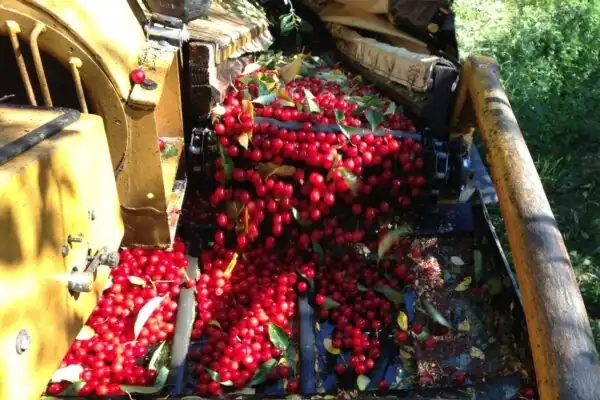Dormancy breakers are widely used in regions where chill accumulation is insufficient and intervention is therefore necessary to increase the floral bud break. Hydrogen cyanamide (HC) is a product not authorized in Europe and many other countries due to its harmful effects on human health and the environment.
In response to the growing urgency of identifying effective and sustainable alternatives to hydrogen cyanamide (HC) as a dormancy-breaking agent in cherry cultivation, a recent study conducted in Turkey compared the effectiveness of hydrogen cyanamide (commercial product Dormex®) with that of the biostimulant "Levante" (LV).
Chill accumulation was quantified monthly using temperatures below 7.2°C. The study was carried out on the cultivar “Royal Tioga®”, grafted onto MaxMa 14 with a spacing of 4 x 2.5 m. This variety, which requires a low amount of chilling (350–500 hours), is increasingly adopted in Mediterranean regions affected by insufficiently cold winters.
Chill accumulation and bud break
The application of LV and HC, performed 30 days before the expected vegetative restart, showed an effect on the physiology of the flower buds, promoting a decrease in abscisic acid (ABA) and an increase in gibberellic acid (GA3), two key phytohormones in the regulation of dormancy.
The biostimulant LV, composed of nitrogen, calcium, and a complex of lipids, glycolipids, oligosaccharides, and polysaccharides, stood out for its ability to anticipate and synchronize bud break, with a rate of 56.8%, comparable to that recorded with HC.
LV also promoted fruit set, reaching 85.2%, significantly higher than the 53.8% observed in the control group. Trees treated with LV and HC also reached fruit maturity on April 24, about ten days earlier than untreated trees, highlighting a strategic potential to anticipate the harvest and gain earlier market access.
Production and fruit quality
From a production perspective, both treatments showed similar yields (3.7 kg per tree for LV and 3.5 kg per tree for HC), compared to a very low 0.5 kg per tree in the control group — confirming the need for dormancy-breaking interventions in low-chill conditions.
Moreover, the fruit quality parameters — weight, soluble solids content (°Brix), titratable acidity, firmness, and skin color — were equivalent or superior in the LV and HC treatments compared to the control.
It is also worth noting the significant increase in sugar content (glucose, fructose, and sucrose), organic acids (malic, tartaric, and citric), and total phenolic compounds, indicating a higher organoleptic and nutritional quality of the fruits.
Economic and environmental advantages
Economic considerations complete the picture: application costs per hectare were approximately €369 for LV, lower than the €470 (approx. $505) required for HC, making the biostimulant “Levante” a valid alternative also from a financial standpoint, in addition to its environmental benefits, especially in European contexts where the use of HC is banned.
In conclusion, the study indicates that the biostimulant “Levante” represents a promising, safe, and cost-effective alternative to hydrogen cyanamide in the cultivation of early cherry varieties (especially “Royal Tioga®”) in Mediterranean environments where achieving sufficient chill accumulation is challenging.
Source: İmrak, B., Kafkas, N. E., Çömlekçioğlu, S., Bilgin, Ö. F., Gölcü, A. E., Burgut, A., Attar, Ş. H., Küçükyumuk, C., & Küçükyumuk, Z. (2025). A Comparative Study of Dormex® and Biostimulant E6ects on Dormancy Release, Productivity, and Quality in ‘Royal Tioga®’ Sweet Cherry Trees (Prunus avium L.). Horticulturae, 11(3), 250. https://doi.org/10.3390/horticulturae11030250
Image source: SL Fruit Service
Andrea Giovannini
University of Bologna (ITA)
Cherry Times - Tutti i diritti riservati










